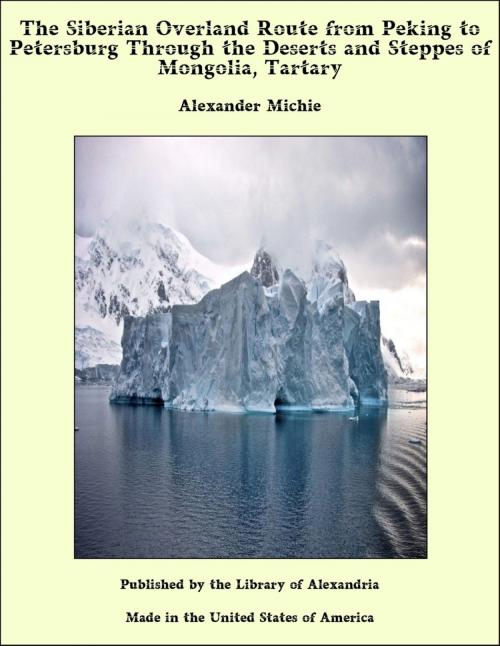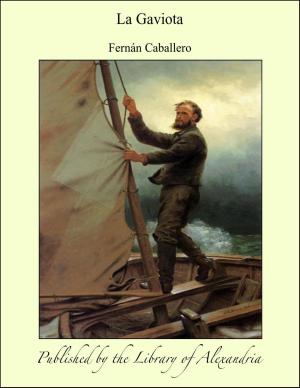The Siberian Overland Route from Peking to Petersburg Through the Deserts and Steppes of Mongolia, Tartary
Nonfiction, Religion & Spirituality, New Age, History, Fiction & Literature| Author: | Alexander Michie | ISBN: | 9781465623508 |
| Publisher: | Library of Alexandria | Publication: | March 8, 2015 |
| Imprint: | Language: | English |
| Author: | Alexander Michie |
| ISBN: | 9781465623508 |
| Publisher: | Library of Alexandria |
| Publication: | March 8, 2015 |
| Imprint: | |
| Language: | English |
The charming narrative of John Bell, of Antermony, who, in the reign of Peter the Great, travelled from Petersburg to Peking in the suite of a Russian ambassador, inspired me with a longing desire to visit Siberia and other little-known regions through which he passed. Having occasion to return to England, after a somewhat protracted residence on the coast of China, an opportunity presented itself of travelling through the north of China, Mongolia, and Siberia, on my homeward journey. This is, indeed, the real "overland route" from China, and it may as properly be styled "maritime," as the mail route per P. & O. steamers "overland." The so-called overland route has, however, strong temptations for a person eager to get home. There is a pleasing simplicity about the manner of it which is a powerful attraction to one who is worn out with sleepless nights in a hot climate. It is but to embark on a steamer; attend as regularly at meal times as your constitution will permit; sleep, or what is the same thing, read, during the intervals; and fill up the blanks by counting the passing hours and surveying your fellow passengers steeped in apoplectic slumbers under the enervating influence of the tropics. The sea route has, moreover, a decided advantage in point of time. In forty-five or fifty days I could have reached England from Shanghae by steamer: the land journey viâ Siberia I could not hope to accomplish in less than ninety days. But the northern route had strong attractions for me in the kind of vague mystery that invests the geography of strange countries, and the character, manners, and customs of their inhabitants. Ever-recurring novelties might be expected to keep the mind alive; and active travelling would in a great measure relieve the tedium of a long and arduous journey. Of the two, therefore, I preferred the prospect of being frozen in Siberia to being stewed in the Red Sea. The heat of Shanghae in the summer was intense and almost unprecedented, the supply of ice was fast undergoing dissolution, and an escape into colder regions at such a time was more than usually desirable. A few years ago it would have been about as feasible to travel from China to England by way of the moon as through Peking and Mongolia. Peking was a sealed book, jealously guarded by an arrogant, because an ignorant, government. Little was known of the city of the khans except what the Jesuits had communicated in the last century, and what that prince of travellers, Marco Polo, had handed down from the middle ages. No foreigner dared show his face there, except in the guise of a native, and even then at the risk of being detected and subjected to the greatest indignities. The Jesuits, it is true, in the face of the prohibition, continued to smuggle themselves into China, and even into Peking itself, and their perseverance and tenacity of purpose are entitled to all praise. But theyoccasionally paid dearly for their temerity, and not unfrequently got themselves and their "Christians" into hot water with the authorities. This received the high-sounding name of "persecution;" and if any one lost his life for meddling in other people's affairs, or interfering with the prerogative of the government, he was honoured with the name of a "martyr." The Jesuits had their day of power in China, and if they had but used it modestly they might still have stood at the elbow of the Emperor. They were tried and found wanting, expelled from Peking, and China was closed against foreigners, not, it must be confessed, without some reason.
The charming narrative of John Bell, of Antermony, who, in the reign of Peter the Great, travelled from Petersburg to Peking in the suite of a Russian ambassador, inspired me with a longing desire to visit Siberia and other little-known regions through which he passed. Having occasion to return to England, after a somewhat protracted residence on the coast of China, an opportunity presented itself of travelling through the north of China, Mongolia, and Siberia, on my homeward journey. This is, indeed, the real "overland route" from China, and it may as properly be styled "maritime," as the mail route per P. & O. steamers "overland." The so-called overland route has, however, strong temptations for a person eager to get home. There is a pleasing simplicity about the manner of it which is a powerful attraction to one who is worn out with sleepless nights in a hot climate. It is but to embark on a steamer; attend as regularly at meal times as your constitution will permit; sleep, or what is the same thing, read, during the intervals; and fill up the blanks by counting the passing hours and surveying your fellow passengers steeped in apoplectic slumbers under the enervating influence of the tropics. The sea route has, moreover, a decided advantage in point of time. In forty-five or fifty days I could have reached England from Shanghae by steamer: the land journey viâ Siberia I could not hope to accomplish in less than ninety days. But the northern route had strong attractions for me in the kind of vague mystery that invests the geography of strange countries, and the character, manners, and customs of their inhabitants. Ever-recurring novelties might be expected to keep the mind alive; and active travelling would in a great measure relieve the tedium of a long and arduous journey. Of the two, therefore, I preferred the prospect of being frozen in Siberia to being stewed in the Red Sea. The heat of Shanghae in the summer was intense and almost unprecedented, the supply of ice was fast undergoing dissolution, and an escape into colder regions at such a time was more than usually desirable. A few years ago it would have been about as feasible to travel from China to England by way of the moon as through Peking and Mongolia. Peking was a sealed book, jealously guarded by an arrogant, because an ignorant, government. Little was known of the city of the khans except what the Jesuits had communicated in the last century, and what that prince of travellers, Marco Polo, had handed down from the middle ages. No foreigner dared show his face there, except in the guise of a native, and even then at the risk of being detected and subjected to the greatest indignities. The Jesuits, it is true, in the face of the prohibition, continued to smuggle themselves into China, and even into Peking itself, and their perseverance and tenacity of purpose are entitled to all praise. But theyoccasionally paid dearly for their temerity, and not unfrequently got themselves and their "Christians" into hot water with the authorities. This received the high-sounding name of "persecution;" and if any one lost his life for meddling in other people's affairs, or interfering with the prerogative of the government, he was honoured with the name of a "martyr." The Jesuits had their day of power in China, and if they had but used it modestly they might still have stood at the elbow of the Emperor. They were tried and found wanting, expelled from Peking, and China was closed against foreigners, not, it must be confessed, without some reason.















